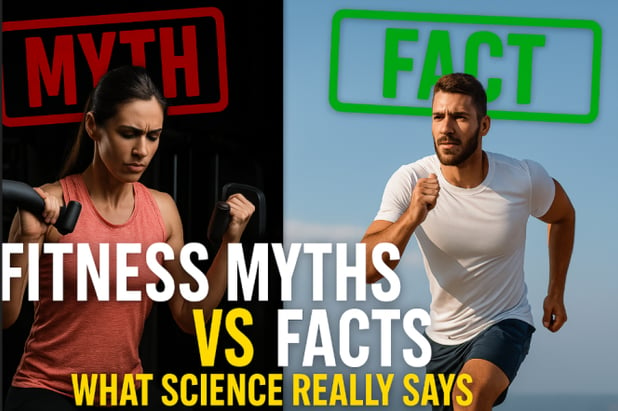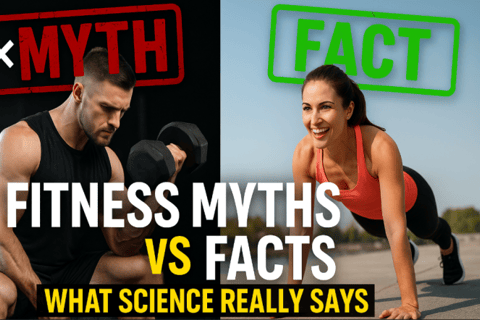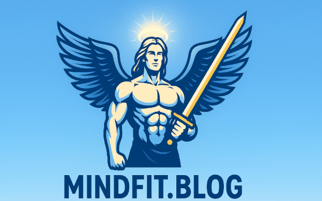🧬 What Science Says About Getting Fit: Myths, Facts, and Real Results
When it comes to getting fit, there’s no shortage of advice. From fad diets to extreme workouts, the internet is full of conflicting information. But what actually works? What does real science say about getting fit — and staying that way? In this article, we’ll cut through the noise and break down the most common fitness myths, reveal the evidence-backed facts, and show you how to get real, sustainable results using what science actually proves — not what sells the most supplements.
FITNESS
PHILIP DEVILLE
4/29/20254 min read


🧬 What Science Says About Getting Fit: Myths, Facts, and Real Results
When it comes to getting fit, there’s no shortage of advice. From fad diets to extreme workouts, the internet is full of conflicting information.
But what actually works?
What does real science say about getting fit — and staying that way?
In this article, we’ll cut through the noise and break down the most common fitness myths, reveal the evidence-backed facts, and show you how to get real, sustainable results using what science actually proves — not what sells the most supplements.
1. Myth: You Have to Work Out Every Day to See Results
✅ Fact: Recovery is just as important as training.
Science shows that muscle growth happens during rest, not while you're lifting weights. Overtraining can actually hurt progress and increase the risk of injury.
What to do instead:
Aim for 3–5 focused training sessions a week
Include rest days or active recovery (like walking or yoga)
Sleep 7–9 hours nightly — sleep is when your body repairs!
Key insight: Progress = stress + rest + nutrition.
2. Myth: Cardio Is the Best Way to Lose Fat
✅ Fact: Fat loss is driven by a calorie deficit, not cardio alone.
Yes, cardio burns calories — but so does strength training. More importantly, building lean muscle increases your metabolism, helping you burn more calories all day, even at rest.
Best approach:
Combine resistance training + cardio
Focus on sustainable movement (walking, strength circuits, interval training)
Track your food and movement for a full-picture calorie strategy
Science says: Strength training + daily activity = most effective fat loss combo.
3. Myth: You Can Spot-Reduce Belly Fat
✅ Fact: Spot reduction is a myth — your body loses fat systemically.
Doing 100 crunches won’t flatten your stomach. Fat loss happens all over your body based on genetics and lifestyle — not targeted workouts.
What actually works:
Create a modest calorie deficit
Eat whole foods with protein, fiber, and healthy fats
Be consistent — fat comes off in layers, not spots
You can train muscles underneath fat, but only overall fat loss will make them visible.
4. Myth: More Sweat = More Fat Burn
✅ Fact: Sweat is not fat — it’s water.
Sweating helps regulate body temperature, not melt fat. You might weigh less after a sweaty session, but it’s just water loss — not actual fat burn.
Instead, focus on:
Heart rate zones (for effective fat burning)
Workout quality over sweat quantity
Hydration — it helps metabolism and muscle performance
Sweating is not proof of progress — consistency is.
5. Myth: You Need Supplements to Get Fit
✅ Fact: Most people don’t need anything beyond whole food, water, and sleep.
While some supplements (like protein powder, creatine, or omega-3s) can help, they’re not essential unless you have a specific deficiency or advanced goal.
Your foundation should be:
Real food
Regular workouts
Rest and recovery
Stress management
Supplements can help — but they should never replace discipline and consistency.
6. Myth: Eating Late at Night Makes You Gain Fat
✅ Fact: It’s not when you eat — it’s how much you eat.
Studies show that total daily calorie intake matters more than meal timing. Late-night meals can be a problem if they lead to overeating — not because of the time itself.
What works better:
Eat most of your calories when you’re active
Avoid mindless snacking in front of screens
Focus on high-protein, high-fiber meals to stay full
Want to eat at 9 p.m.? You can — as long as it fits your day’s calorie needs.
7. Real Results: What Science-Backed Fitness Looks Like
When you apply what science actually says, fitness gets simpler and more sustainable.
Here’s what works — no hype, no gimmicks:
🏋️♂️ Strength train 3–4 times a week
🚶♀️ Stay active daily (walk, stretch, move!)
🥦 Eat nutrient-dense foods with lean protein, veggies, and healthy fats
😴 Sleep 7–9 hours per night
🧠 Manage stress (breathing, journaling, faith, or rest days)
This approach may not sell like “six-pack in 6 days” scams…
But it works — and it lasts.
💡 Short Q&A: What Science Says About Getting Fit
Q: What’s the biggest lie in the fitness industry?
A: That results should come fast. Real change takes time, effort, and consistency — not shortcuts.
Q: Is walking enough to get fit?
A: Walking is an amazing foundation. Combine it with strength training and good nutrition for full results.
Q: What’s the #1 most science-backed fat-loss strategy?
A: A sustainable calorie deficit paired with resistance training.
✅ My Conclusion:
Getting fit doesn’t require hacks — it requires truth.
When you understand the science behind your body, you stop wasting time and start making progress that actually sticks.
Forget the noise. Trust the data.
And remember: Fitness isn’t complicated — it’s consistent.
⚠️ Disclaimer:
This article is for informational purposes only and is not medical advice. Fasting and any diet changes may affect individuals differently. Always consult with a qualified healthcare professional before starting any fasting plan, diet, or weight loss program, especially if you have pre-existing health conditions or take medications. Results vary, and this content is based on personal experience and research. Your health and safety come first! 🚀🔥
We are affiliates. It means that we might receive a commission if you ever buy a product on our website, with no-extra cost for You of course. Thank You very much!
(Some parts of this article was written with the help of AI to provide the most effective and well-researched tips.)
Written by Philip DEVILLE


Empowerment
Transform your mindset for lasting weight loss.
Support
Journey
contact@mindfit.blog
© 2024. All rights reserved.
Disclaimer: We are not doctors. You should see one before starting any diet or routine in your life, especially if you are under conditions! Plus, We are affiliates. Which mean we may receive a commission if You ever purchase a product on our site, with no extra-cost for You of course! Thank You Very Much!
